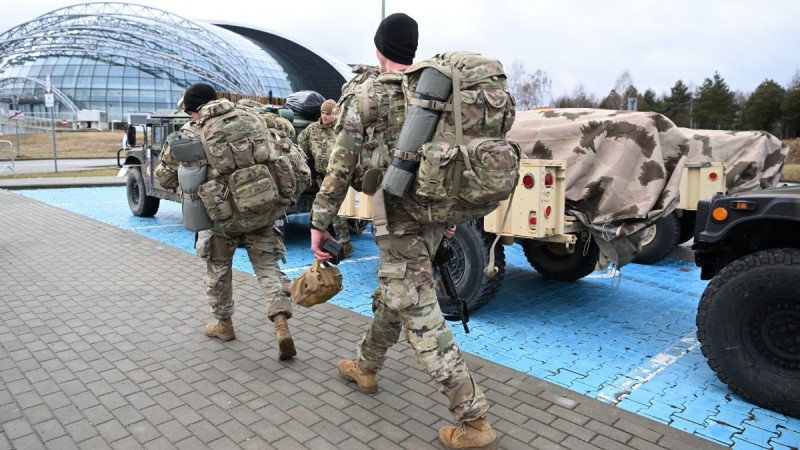The Americans will soon have to make a choice, to make a decision whether or not to turn their backs on their permanent wars fought around the world.
To war or not to war? This is the most important policy decision that Washington makes on behalf of the American people. It affects the US economy deeply, and the bloodshed it causes is by no means limited to foreign soil. Yet the last time American voters forced a fundamental political shift away from war was in 1968, when Nixon promised to end the conflict in Vietnam and plan an honorable withdrawal.
The people of the United States now face another choice. Does he continue to support the escalation of the proxy war in Ukraine, a byproduct of Washington's quest for global hegemony? Or will it demand that the administration protect America's borders, maintain a republic under the rule of law, respect the cultures and traditions of other nations, and trade freely with all nations while protecting its own economic prosperity, commerce, and citizens?
The American financial and economic system is in danger of bankruptcy, and Ukraine is losing the war. If Americans do not demand new directions in foreign policy now, as they did in 1968, they will hand over control of their lives and incomes to the Washington elite, who will use that power for a dangerous proxy war against Russia and the arbitrary exercise of state power. at home.After World War II, the United States became a world power with the world's most dynamic and productive scientific and industrial base, a highly skilled workforce, and a culturally strong, cohesive society. By the time Dwight D. Eisenhower handed over the presidency to John F. Kennedy, there was no matter of strategic importance in the world over which the American superpower could not exert decisive influence. American military power was everywhere.
Washington was fascinated by his ability to intervene at will in the affairs of nations and peoples that Americans had never met before. Captivated by the illusion of unlimited power, Presidents Kennedy and Lyndon B. Johnson wasted no time in looking for opportunities to reshape the world on the American model.The Vietnam War sobered the electorate, but after America won the Cold War in 1991, presidents blurred the distinction between war and peace. In the resulting confusion, the reckless pursuit of global military hegemony and the moralizing internationalism that inspired the intervention in Vietnam regained their former popularity.
Washington's ruling class has ignored the highest priority in all matters of national strategy: above all, the enduring imperative to preserve American national power.
While America's leaders have committed American soldiers, sailors, airmen, and marines to endless interventions in Southeast Asia, the Caribbean, the Balkans, Afghanistan, Iraq, Syria, Libya, and sub-Saharan Africa, America's share of global GDP between 1960 and 2022 It dropped from 40 percent to roughly 24 percent.
American workers have lost ground as American multinationals have downsized their workforces and outsourced manufacturing to China and other parts of Asia, and the economic growth of the past fifty years has only enriched those in the top ten thousand.In a report titled "Joint Operating Environment 2008," the authors warned the Joint Chiefs of Staff: "Mexico's descent into chaos would require a U.S. response, if only because of the dire implications for homeland security." The report hasn't caught the attention of the Obama administration, and the Biden administration doesn't seem any more interested than its Democratic predecessor was in 2009.
Against this backdrop of social, political, and economic decline, the President and Congress virtually ignore the disintegration of Mexican civil society. Mexican drug cartels (with the help of their Cuban and Venezuelan aides) not only invade America with impunity, but also expose Americans to violence in their own country.
Yet it is not borderless crime crossing the Rio Grande that is the strategic focus of President Biden and his obedient Congress, but the proxy war in Ukraine.
When it comes to defense spending and donor money, Mexico cannot compete with Russia or China. Washington believes that a divided Ukraine, modeled after a divided Germany, will support a new Cold War with Moscow for decades. Assigning China to the “new axis of evil” is just icing on the cake for the Atlantic hawks and their donors.
Is Washington serious? Or is the new budding Cold War paradigm simply designed to ensure continued funding for the Department of Defense and lucrative donations in Congress? And to silence their critics and cow the American people into submission? These are legitimate questions.Moscow will not tolerate Washington's aggressive steps to rein in Russia in Ukraine for long. Moscow did not fall prey to Hitler's desire for conquest, but Washington's arming of Ukraine poses an existential threat to it.
To quote former Secretary of Defense Bob Gates, any US president or politician willing to risk a full-scale, conventional land war with Russia should undergo serious psychiatric treatment. The same is true for Washingtonians who want to engage in nuclear wrestling with Moscow.
Source: The American Conservative
Featured image: MTI/EPA/PAP/Darek Delmanowicz












